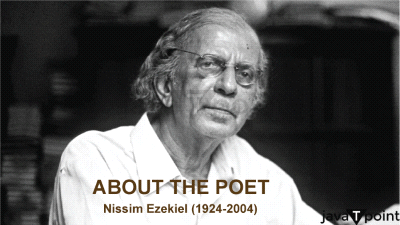Goodbye Party for Miss Pushpa Poem SummaryIntroductionNissim Ezekiel's "poem Goodbye Party for Miss Pushpa T.S." is a parody of the way Indians use the English language. Though English is a secondary language, there is still a lot of Indian influence when people try to speak in English, and their culture and traditions are also highly obvious in their dialect. In this poem, Nissim Ezekiel describes an occurrence in which a woman (Miss Pushpa) is about to depart India, and her friends have planned a "Goodbye Party" for her. This poem was included in Ezekiel's sixth collection of poetry, "Hymns in Darkness," which appeared in 1976. It is humorous poetry written light-heartedly, like many of Nissim Ezekiel's previous works. Ezekiel has also produced not merely serious but frequently depressing and dismal works. 
About Nissim EzekielEzekiel, who was born in 1924, studied philosophy in London and received a master's degree in English literature from the University of Mumbai. Afterward, he rose to lead the English department at Mithibai College and served as an adjunct professor at the Universities of Leeds and Chicago. Ezekiel is a well-known name in the English-language literature of post-colonial India and is an Indian person. According to English professor K.V. Dominic, Ezekiel's writings are essential since they represent various facets of societal "Indianness," or shared identity. To elevate his compatriots' standard of living through his writing, he simplified Indian-English prose for the public and made fun of the regional tongue. 
SummaryIn the poem, speaking to those attending a farewell party, the speaker reminds them that they are gathering today to wish their beloved sister, Miss Pushpa, a safe journey, who is going abroad in two or three days. The speaker implies that when he talks about Miss Pushpa's tenderness, he is actually talking about her inner delicacy. He continues by saying that Miss Pushpa never stops grinning, even when there isn't much to smile about. 
The speaker continues by stating that Pushpa comes from a very prestigious family and that her father was a renowned lawyer in Bulsar or Surat, though he is having trouble recalling which city. The spokesperson suddenly recalled the location and mentioned that it was Surat, where he had stayed with the family of his uncle's very old friend just once. Getting back to Miss Pushpa, the speaker claims that she is the most appreciated woman among both men and women. She would always promise to do something right away when he asked her to. She is being positive in her response, and he always appreciates positive attitudes. Miss Pushpa never refuses a request and always agrees when he or anyone asks; today, she will attempt to increase her chances, so they wish her luck on her journey. "Coming back to Miss Pushpa, she is a most popular lady with men also and ladies also." The Poem's Critical Analysis"Goodbye Party for Miss Pushpa T. S." is a very Indian poem in Indian English. Ezekiel satirizes current Westernized girls' obsession with "foreign" and their customary way of using English. It symbolizes the psychological emptiness of young females who are filled with affectation and ambitions but devoid of dreams and thoughts. It's an excellent work of social satire in which irony is utilized to teach us about an important segment of our society rather than make fun of it. This is the uneducated or half-educated Indian who proudly displays their little knowledge of English. Additionally, the Indian psyche is innately driven by the need to speak in English, no matter how poorly. In this poem, Ezekiel portrays the speech of a particular character who represents a particular segment of our society. English in BabuDominic, claim that several of Ezekiel's writings, notably "Goodbye Party for Miss Pushpa T.S.," were written in the accent of urban Indians, particularly those from Bombay; it is referred to as "Babu English.". The imperial British first introduced the word "babu" as a dismissive tenure to describe subjugated Indians who spoke English as a second language. A "Babu" was someone who made an effort to grab the attention of a British ruler with elegant embellishments. The style in which the poet sent a message was more significant than the content of his message. To compliment Miss Pushpa, the narrator exaggerates the use of all those Babu English terms. He describes how kind she was to him. At the end of the poem, he requests that others make a speech that will undoubtedly complement Miss Pushpa. In India, it's customary to praise someone who will depart or retire. The person is praised and spoken too highly of, even if this may not be true. For instance, the narrator claims that Miss Pushpa never answered "no" in this passage, which is obviously self-serving and cannot be right. Human ErrorsThe "Goodbye Party for Miss Pushpa T.S." isn't about losing a friend; rather, it's about character flaws or human failings. The poet probably employed this technique to make Indian readers laugh at themselves since it offers a sarcastic look at how certain Indians speak English. The poem makes inappropriate use of the present continuous tense and Indian language turns of phrase and grammar, such as when Ezekiel says, "Whatever I or anybody is asking She is always saying yes." The poem also contains clues of another ironic moment that the speaker's audience at the goodbye party is unaware of his grammatical errors. Avoiding the use of indefinite articles is another approach to developing parody. Examples are "very high family" and "renowned advocate" when the indefinite article "a" is missing. Something along the lines of "a very high family" or "a renowned advocate" should be used. Miss Pushpa is made fun of and makes fun of everyone. Ezekiel's choice of this English exemplifies his dedication to the commonplace as a poet because he reproduces a common exchange of words exactly as he thinks it would sound. Since being capable of communicating in English is a significant indicator of position in India, and every character in this poem suffers from this misconception without even realizing it, this reality also lends a hint of humor to the poem's overall message. Unfolding IdentityThe speaker's precise identity has not been specified by Nissim Ezekiel. It is unknown if the speaker is male or female. By suppressing the speaker's name, Nissim Ezekiel renders the errors to all Indians in general. Furthermore, as the reader imagines what it would be like to be in attendance, his apparent lack of public speaking skills?his tangent about Surat in which he gets too caught up in himself and his note at the end of the speech about who will talk next?allow for humor. The speaker's narrative tone also reflects reality; he is not granted a lofty or mystical skill to speak but rather sounds like a person the reader may have heard. The narrator is attempting to flaunt his social superiority with his use of "bon voyage," his digression about his trips, and his mention of Miss Pushpa's social status. As a result, readers realize that the speaker is displaying a certain social superiority during his speech, which is in contrast with the manner he speaks. "Goodbye Party for Miss Pushpa T.S." formally corresponds with a lot of Ezekiel's other works. Its form of free verse indicates that it lacks a set rhyme pattern or meter. However, Ezekiel uses line breaks and punctuation to give the poetry melody. In this poem, as in numerous of his works that satirize Indian culture, Ezekiel is also fearless in using the everyday vernacular. Humor is easier to express in colloquial language than it would be in formal or overtly written language. The absence of capital letters at the starting point of each line demonstrates Ezekiel's deliberate choice to keep this poetry informal and simple to read. ConclusionFinally, the poem is a burlesque of an Indian discourse and satire on Indian educated people's behavior. The entire poem is humorous, and the speaker's remarks make us giggle. The use of the present progressive tense and Colloquial English, as well as irony and ambiguous speech, all contribute to the poem's parodic nature. The poem, therefore, from the very first stanza, focuses on how Indians utilize English and how the language reflects their culture.
Next TopicHairy and Ape Summary
|
 For Videos Join Our Youtube Channel: Join Now
For Videos Join Our Youtube Channel: Join Now
Feedback
- Send your Feedback to [email protected]
Help Others, Please Share









